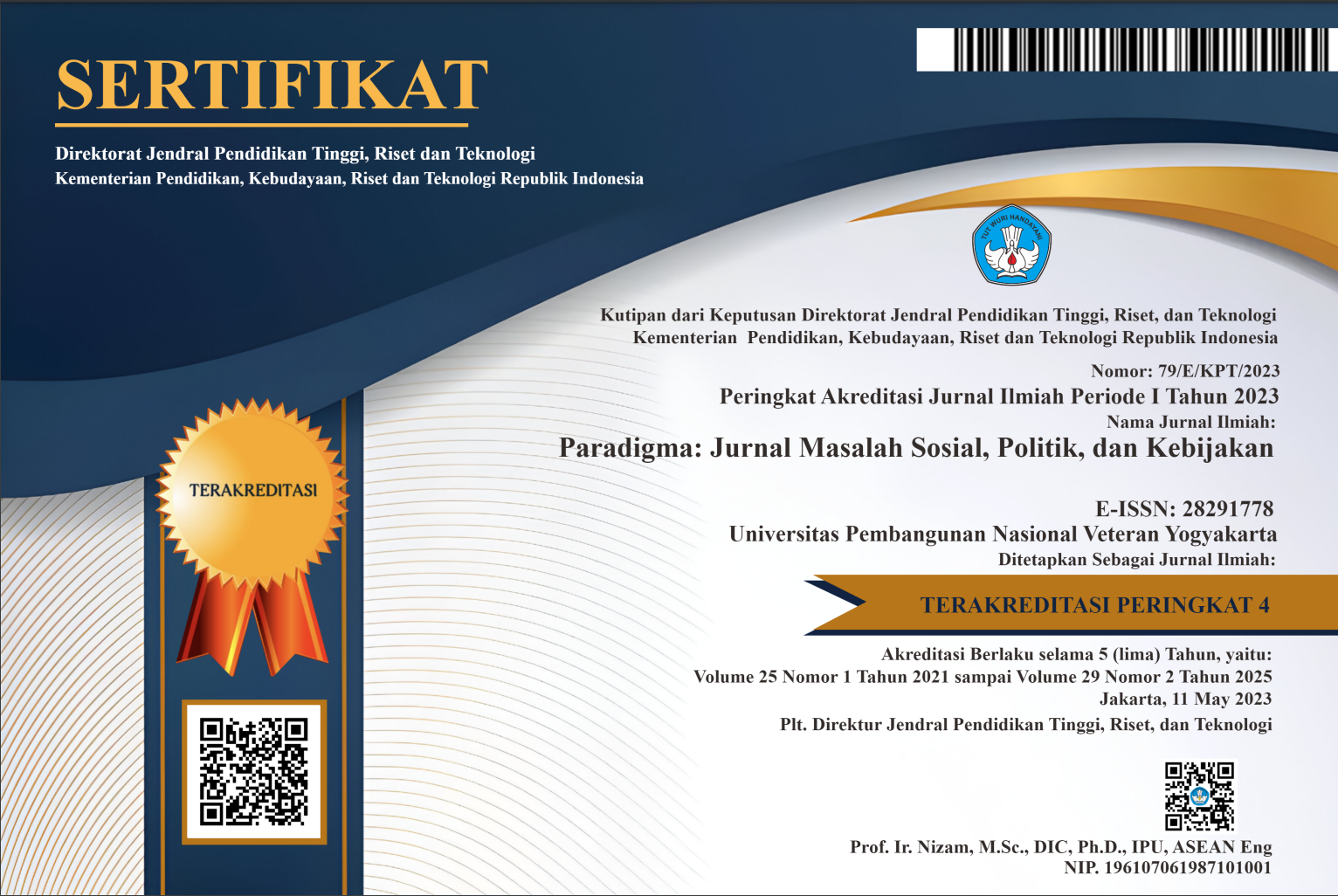EFEKTIVITAS RATIFIKASI UNITED NATIONS CONVENTION AGAINST TRANSNATIONAL ORGANIZED CRIME (UNTOC) TERHADAP TINGKAT KRIMINALITAS HUMAN TRAFFICKING DI INDIA TAHUN 2014-2018
Abstract
ABSTRAK
India merupakan salah satu negara dengan kasus perdagangan manusia yang cukup tinggi. Hingga saat ini, kasus yang terjadi masih cukup tinggi. Pada tahun 2011, India pada akhirnya setuju untuk meratifikasi konvensi PBB yaitu United nations Convention Against Transnational Organized Crime (UNTOC) bersama dengan Palermo Protocol untuk memerangi kasus perdagangan manusia. Permasalahan perdagangan manusia di India cukup kompleks karena ada beberapa faktor seperti budaya patriarki, permasalahan perbatasan, dan kewenangan hukum yang tidak berjalan semestinya. Dengan adanya ratifikasi UNTOC, diharapkan memiliki pengaruh terhadap kebijakan dalam negeri India dalam memerangi perdagangan manusia. Studi ini ditulis untuk mengetahui sejauh mana pengaruh UNTOC dan Palermo Protocol terhadap kebijakan dalam negeri India dalam hal penanganan perdagangan manusia.
Kata Kunci: UNTOC, Palermo Protocol, India, Kebijakan.
ABSTRACT
India is one of the countries with a relatively high number of cases of human trafficking. Until now, the number of reported cases has remained quite high. In 2011, India ratified the United Nations Convention Against Transnational Organized Crime (UNTOC) and the Palermo Protocol to combat human trafficking. Human trafficking is a complex problem in India because of factors such as patriarchal culture, border issues, and ineffective legal authority. It is hoped that the ratification of UNTOC will have an impact on India's domestic policy in combating human trafficking. The purpose of this study was to determine the extent to which UNTOC and the Palermo Protocol influenced India's domestic policy regarding human trafficking.
Keywords: UNTOC, Palermo Protocol, India, Policy.
Keywords
Full Text:
PDF (Bahasa Indonesia)References
Buku
Creswell, John W. (2003). Research Design: Qualitative, Quantitative, and Mixed Method Approaches. California: Sage Publications.
Folker , Jennifer Sterling. (2013). Making Sense of International Relations Theory. Second Edition. USA: Lynne Rienner Publisher, USA.
Underdal, Arild, et al. (2011). Environmental Rezime Ef ectiveness: Confronting Theory with Evidence. Cambridge: MIT Press.
Jurnal
Fisher, Roger. (1981). “Improving Compliance with International Law”. Virginia: University Press of Virginia. Hal. 20.
Jani, Nairruti & Felke, T.P (2017). “Gender Bias and Sex-Trafficking in Indian Society”. International Social Work 2017.Vol. 60(4) Sagepub. Hal 831–846.
Lamy, Steven L. (2008). “Contemporary Mainstream Approaches: Neo-Realism and Neo-Liberalism”. Dalam Baylish, John and Smith, Steve, ed. The Globalization of World Politics and Introduction to International Relations. New York: Oxford University Press.
Silitonga, Sophia A. E. (2017). “Kepentingan India Dalam Meratifikasi Protokol Palermo Tahun 2011”. JOM FISIP Universitas Riau. Vol. 4 No. 2. Riau. Hal. 09.
Upadhyay, Nindhi. (2017). “The Problem of Women Trafficking Over Indo-Nepal Border”. Indian J. Soc. & Pol. 04(01):2017, hal 35-40
Internet
Banerjee, Sreeparna. (2021). The Need For Integrated SOPs To Combat Human Trafficking Along India–Nepal Border, Observer Research Foundation. Observer Research Foundation. https://www.orfonline.org/expert-speak/need-integrated-sops-combat-human-trafficking-along-india-nepal-border/ diakses pada 20 April 2022
Bhalla, Nita. (2016). India Reports 25 Percent Rise In Human Trafficking Cases in 2015. Reuters. https://www.reuters.com/article/us-india-trafficking/india-reports-25-percent-rise-in-human-trafficking-cases-in-2015-idUSKCN1175MQ, diakses pada tanggal 07 April 2020.
Datta, Sayantoni. (2018). Adolescence at the Border. Justice And Care. https://www.justiceandcare.com/wp-content/uploads/sites/4/2018/06/AdolescenceattheBorder.pdf diakses pada 14 April 2022
Doshi, Vindi. (2016). 'I Was So Scared … I Was Tortured': Indian Women Lift The Lid On Married Life. The Guardian. https://www.theguardian.com/global-development/2016/nov/25/scared-tortured-indian-women-lift-lid-married-life diakses pada 14 Januari 2022
Estal, Elena Del. (2018). ’I Was Bought For 50,000 Rupees': India's Trafficked. The Guardian. https://www.theguardian.com/global-development/2018/mar/07/india-girls-women-trafficked-brides-sexual-domestic-slavery diakses pada 14 Januari 2022
Hindustan Times. (2016). 8132 Cases Of Human Trafficking Reported In 2016, Average 63 Victims Rescued A Day. https://www.hindustantimes.com/india-news/8132-cases-of-human-trafficking-reported-in-2016-average-63-victims-rescued-a-day/story-OguqzIq50jiFZrvg51hrmL.html diakses pada 5 Maret 2022
Lok Sabha Secretariat. (2013). The Nineteenth Report Lok Sabha Victim of Sexual Abuse and Trafficking and Their Rehabilitation. https://eparlib.nic.in/bitstream/123456789/63980/1/15_Empowerment_of_Women_22.pdf diakses 03 April 2022
Ministry of External Affairs. (2015). MoU Between India and Bangladesh on Bilateral Cooperation for Prevention of Human Trafficking Especially Trafficking in Women in Children; Rescue, Recovery, Repatriation and Re-Integration of Victims of Trafficking. https://www.mea.gov.in/Portal/LegalTreatiesDoc/BG15B2411.pdf diakses pada 12 April 2022.
Ministry of Home Affairs. (1986). Central Armed Police Forces. https://www.mha.gov.in/about-us/central-armed-police-forces diakses pada 4 April 2022
Ministry of Home Affairs. (2017). MHA Annual Reports 2016-2017. https://web.archive.org/web/20170903223440/http://mha.nic.in/sites/upload_files/mha/files/EnglAnnualReport2016-17_17042017.pdf diakses pada 07 April 2022
Mehroon, Nisa & Ayush Agrawal (2021). Why AHTUs Role In Investigating Human Trafficking Cases Is Critical To Reach Their Logical Ends. First Post. https://www.firstpost.com/india/why-ahtus-role-in-investigating-human-trafficking-cases-is-critical-to-reach-their-logical-ends-9979931.html diakses pada 14 Januari 2021
Nagaraj, Anuradha. (2019). Indian Tafficking Cases Fall Sharply Fuelling Concern Over 'Undetected Victims’. https://www.reuters.com/article/us-india-crime-trafficking-idUSKBN1X11WK diakses pada 20 April 2022.
Nagaraj, Anuradha. (2019). India's Human Traffickers Escaping Punishment As Data Shows Few Convictions. https://www.reuters.com/article/us-india-slavery-court-idUSKCN1VO1BD, diakses pada 14 Januari 2022
National Crime Records Berau. (2016). Crime in India Table Human Trafficking 2016. https://ncrb.gov.in/en/crime-india-table-human-trafficking-2016 diakses pada 11 Desember 2021
National Crime Records Bureau. (2016). Human Trafficking Cases (IPC) 2016. http://ncrb.gov.in/crime-in-india-table-addtional-table-and-chapter-contents?page=98, diakses pada tanggal 07 April 2020.
Office of the Registrar General & Census Commissioner. (2011). Census of India : Provisional Population Totals : India :Census 2011. http://censusindia.gov.in/2011-Common/CensusData2011.html, diakses pada tanggal 01 April 2020.
Dubbudu, Rakesh. (2016). Who Is Guarding Our International Borders?. https://factly.in/guarding-international-borders/ diakses pada 14 April 2022
Step Map. (2015). India Bangladesh Nepal. https://www.stepmap.com/map/india-bangladesh-nepal-pCeLR7mUpr diakses pada 15 Januari 2022
U.S Department of State. (2016). Tier Placements. https://2009-2017.state.gov/j/tip/rls/tiprpt/2016/258696.htm, diakses pada tanggal 07 April 2020.
UNICEF. (2019). Ending Child Marriage And Adolescent Empowerment. https://www.unicef.org/india/what-we-do/end-child-marriage diakses pada 13 Juli 2022
UNODC. (2004). United Nations Convention against Transnational Organized Crime and the Protocols Thereto. https://www.unodc.org/unodc/en/organized-crime/intro/UNTOC.html, diakses pada tanggal 07 April 2020.
DOI: https://doi.org/10.31315/paradigma.v27i1.8606
Refbacks
- There are currently no refbacks.
Copyright (c) 2023 Hutami Safina Nur Adriani, Hutami Safina Nur Adriani

This work is licensed under a Creative Commons Attribution-ShareAlike 4.0 International License.
Paradigma: Jurnal Masalah Sosial, Politik, dan Kebijakan
Published by Faculty of Social Science and Political Science
Universitas Pembangunan Nasional "Veteran" Yogyakarta
(Kampus Unit II) Jl. Babarsari 2, Tambakbayan, Depok, Yogyakarta 55281
Phone: +62 274 486733. Email: paradigma@upnyk.ac.id

This work is licensed under a Creative Commons Attribution-ShareAlike 4.0 International License.


